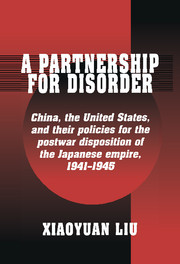 A Partnership for Disorder
A Partnership for Disorder Book contents
- Frontmatter
- Contents
- Acknowledgments
- Note on romanization
- Abbreviations
- Introduction
- 1 The making of an alliance
- 2 The issue of postwar Japan
- 3 China's lost territories
- 4 Korea's independence
- 5 The road to Cairo
- 6 A divisive summit
- 7 Yan'an and postwar East Asia
- 8 Diplomacy without action
- 9 Erosion of a partnership
- 10 The Manchurian triangle
- 11 Bargaining at Moscow
- 12 Epilogue: The crisis of peace
- Appendix I Guiding Plan for Helping the Korean Restoration Movement
- Appendix II Two Chinese documents of the Cairo Conference
- Bibliography
- Index
7 - Yan'an and postwar East Asia
Published online by Cambridge University Press: 20 October 2009
- Frontmatter
- Contents
- Acknowledgments
- Note on romanization
- Abbreviations
- Introduction
- 1 The making of an alliance
- 2 The issue of postwar Japan
- 3 China's lost territories
- 4 Korea's independence
- 5 The road to Cairo
- 6 A divisive summit
- 7 Yan'an and postwar East Asia
- 8 Diplomacy without action
- 9 Erosion of a partnership
- 10 The Manchurian triangle
- 11 Bargaining at Moscow
- 12 Epilogue: The crisis of peace
- Appendix I Guiding Plan for Helping the Korean Restoration Movement
- Appendix II Two Chinese documents of the Cairo Conference
- Bibliography
- Index
Summary
Despite the many cosmetic features of the Cairo Conference, the summit represented a radical departure in the history of Chinese foreign relations. The conference signified China's emergence as an equal among the great powers in the United Nations coalition. Even more important, the Cairo Conference led to a new international definition of the Chinese state by restoring its lost territories. Most astonishing was that these events occurred at a time when China was represented at Cairo by only a single faction in Chinese politics. At the time, the effective authority of the KMT government was limited to the southwestern corner of China. Before continuing this narrative of Sino–American diplomacy with regard to postwar arrangements in East Asia, therefore, it is necessary to examine the views of the CCP, the chief rival of the KMT for power and the party that then controlled extensive territories and population in northern China.
For the purpose of official foreign policymaking, the KMT's monopoly of power was absolute. Other political parties in China, including the CCP, lacked the means to exert direct influence in international affairs. Therefore, Yan'an's views on international affairs became known to the outside world only gradually. Observers of CCP policies had to seek information from reports by a small number of foreign journalists who had opportunities to visit the Communist areas, from the CCP's own propaganda organs, and from occasional contacts between Western diplomats and CCP officials in Chongqing.
- Type
- Chapter
- Information
- A Partnership for DisorderChina, the United States, and their Policies for the Postwar Disposition of the Japanese Empire, 1941–1945, pp. 148 - 174Publisher: Cambridge University PressPrint publication year: 1996
